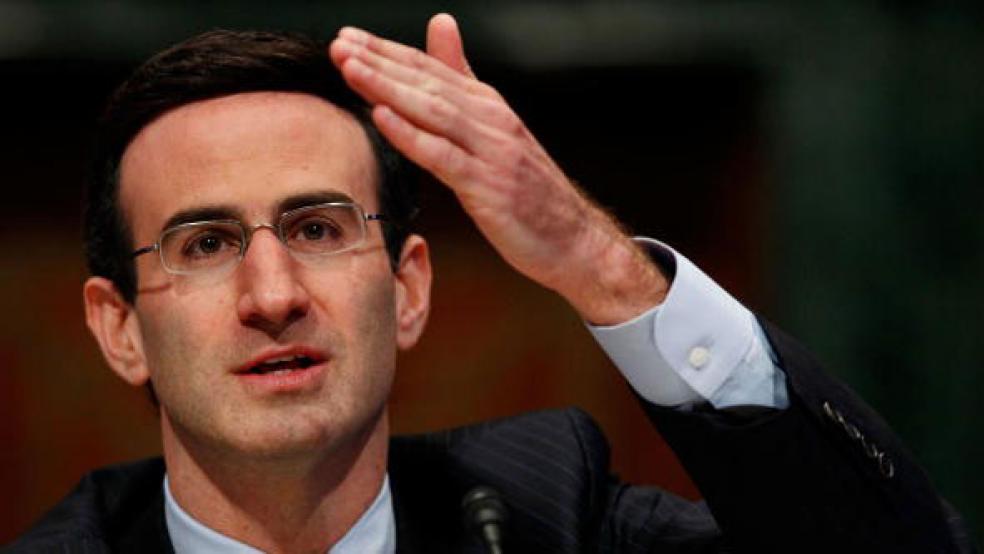The departure of White House Budget Director Peter R. Orszag is unlikely to signal any change in administration policy, but comes at a time when both President Obama and Congress are under growing popular pressure to reduce the long term federal budget deficit.
It also comes when the administration is locked in a pitched battle with Republicans about whether to provide additional stimulus spending and aid to the states, or start cutting the deficit immediately.
Orszag confirmed in an interview Tuesday that he plans to resign next month after almost two tumultuous years in which he helped Obama weather one of the worst recessions in U.S. history and overhaul the nation’s health care system. His departure from the Office of Management and Budget follows months of speculation that he was eager to depart before his wedding in September and the start of another budget cycle.
Orszag, a Princeton-educated economist and a former director of the Congressional Budget Office, was more than the president’s chief bean counter. He was also a central member of Obama’s brain trust and an architect of his health care reform effort. Even though the federal deficit was ballooning at the time he arrived in the White House, mostly because of the financial crisis, Orszag argued that extending insurance to millions of uninsured Americans was a necessary component to controlling long-run health care costs and ultimately to stabilizing federal budgets in the future.
“He was a key player both in the economic stimulus initiative and health reform legislation, and it’s rare for an OMB director to play significant substantive roles in complex policy issues such as those,” said Robert Reischauer, a former director of the Congressional Budget Office who is now head of the Urban Institute. “And of course he comes with a stellar academic background and policy mind on those two topics.”
Senator Kent Conrad, Democrat of North Dakota and chairman of the Senate Budget Committee, called Orszag’s departure “a loss for the administration. Peter Orszag is outstanding, and he has a deep knowledge about the facts of our fiscal condition,’’ Conrad told reporters shortly after the White House made the news official. “He also understands the need to get the economy moving. I’d like to see someone with his qualities replace him.”
In a brief interview with the Fiscal Times, Orszag said he had notified the White House that he would be leaving his job in July. His biggest accomplishments, he said, were passage of the $787 billion economic recovery act and enactment of the president’s health care package.
Speculation on a successor to Orszag includes Rob Nabors, a former deputy to Orszag at OMB who is now in the White House chief of staff’s office; Laura D’Andrea Tyson of the University of California at Berkeley, who served as chief economic adviser to President Bill Clinton; and Gene Sperling, a former top adviser to Clinton and now a counselor to Treasury Secretary Tim Geithner. The bigger uncertainty is how quickly the Senate will approve whomever President Obama nominates as his next budget director, especially if Republicans decide to slow down the process.
Orszag’s resignation was not a surprise. There had been widespread speculation that he was considering leaving the administration, especially after he announced plans to marry Bianna Golodryga, a co-anchor of the “Good Morning America” weekend edition as well as ABC News’s business correspondent. Orszag decided this week that nearly two years at OMB was enough for him, when the average tenure of the budget director was a year and a half, and that he wanted to focus on his wedding, according to a source close to him. According to associates, Orszag wanted relief from what is widely regarded as one of the most grueling jobs in Washington.
Orszag, 41, is the first Cabinet-level member of Obama's team to depart the administration. He is also unusual for being both a dedicated policy wonk and an almost accidental sex symbol. Shortly after Orszag announced his engagement to Golodryga, he announced the birth of a son by his former girlfriend, Claire Milonas, a Greek shipping heiress.
As OMB director, Orszag was a master of budgetary detail as well as a confident economic analyst. Ezra Klein, a blogger and economic columnist for the Washington Post, described him as “young and telegenic, with the earnest precise air of a well-sharpened pencil.”
He came to Obama's government after a short stint as director of CBO, the agency charged with providing nonpartisan analyses of economic issues to lawmakers. While there, he greatly expanded the agency’s staff of health care analysts, convinced that health care would be at the crux of fiscal policy for years to come. Before that, he served during Clinton's administration as an assistant to the president for economic policy and as a senior adviser at the National Economic Council.





